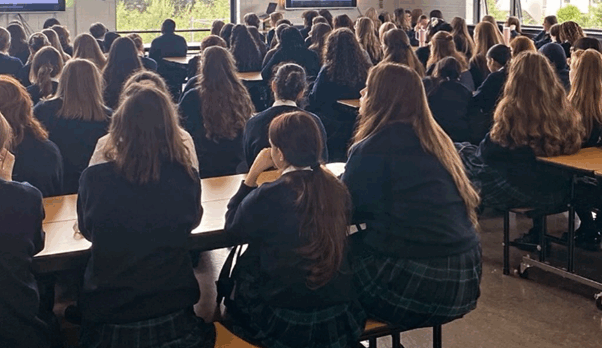
First thing on this blustery Monday morning in November, as I was helping a student change the wheel of a well-worn wheelbarrow, I paused for the briefest of moments to consider the significance of this simple act.
Since the first week in September, students from Coláiste Bríde Presentation Secondary School have been visiting the local allotments in Corkagh Park to assist the service users of St. John of God Liffey Services, adults with intellectual disabilities, to tend their own garden.
As I looked across the allotment, I saw four students shovelling horse manure into another wheelbarrow, ready to enrich the soil in a raised bed where two others were gently guiding service users as they planted daffodil and tulip bulbs. And in that moment, the scene before me seemed to capture perfectly all that we are striving to achieve at Localise. These young people have volunteered their time; they have chosen to make a difference; they have chosen to be the difference.
I often think about the importance of civic infrastructure, the web of relationships and shared experiences that hold our communities together. It is this infrastructure that underpins social cohesion. When young people choose to participate in acts of service, no matter how small, they are helping to strengthen that infrastructure. Through their engagement, these students are learning not only about gardening, not only about people in their community with additional needs, but also learning about themselves, about their capacities for empathy, about taking responsibility, and about making a contribution.
Volunteering, in this sense, becomes a structured programme of learning, a classroom without walls, where lessons of empathy, compassion, and cooperation are lived rather than taught. By fostering lifelong civic participation through such experiences, we cultivate a young citizenry who are empathetic, engaged, and empowered. And by doing so, Ireland strengthens both community wellbeing and the democratic fabric of society.
I often challenge teenagers to think about the difference between a child and an adult. Their responses are usually what you might expect: adults are over the age of eighteen, they’re taller, more mature, they earn more money, and they have more responsibilities. Yet we all know people over eighteen who are small in stature, who don’t work – or choose not to – and who may have fewer responsibilities than a teenager working part-time to support their family, or one who provides care for a relative at home. What we usually come to agree on is that an adult is someone who makes all their decisions for themselves and then takes responsibility for those decisions.
Adolescence is a critical stage for developing identity, empathy, and resilience. It is during this period that volunteering can have the greatest impact, serving as an early empathy intervention that helps young people see the world through another’s eyes. Making the choice to spend time with people who have a disability, choosing to listen, choosing to plant bulbs, choosing to shovel horse manure – these choices form identity. These choices nurture social responsibility, emotional intelligence, and civic readiness.
So as the last bolt on that wheelbarrow was tightened, I couldn’t help but smile. What might have seemed like a trivial act on a Monday morning was, in truth, a quiet act of civic leadership. This student was not just fixing a wheel, she was, in her own way, helping to keep the wheels of her community turning.
Stories from across the Localise community.
Subscribe to get the latest on news, community events and volunteering insights from young people straight to your inbox.


